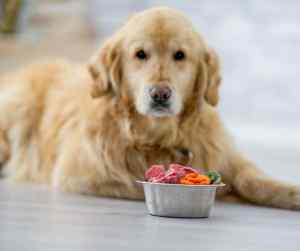Obesity in dogs is a serious health concern characterized by excessive body fat accumulation. Just like in humans, it can lead to a myriad of health problems and significantly impact your dog’s quality of life.
According to recent studies, approximately 56% of dogs in the United States are classified as overweight or obese. This alarming figure highlights the urgent need for awareness and proactive measures to combat this issue.
Dog Breeds Most Commonly Affected by Dog Obesity
While obesity can affect any breed, some are more predisposed than others. Breeds such as Labrador Retrievers, Dachshunds, Beagles, and Cocker Spaniels are among those commonly prone to dog obesity.
Causes of Dog Obesity
Several factors contribute to dog obesity, including:
- Overfeeding: Providing excessive amounts of food or too many treats.
- Lack of Exercise: Insufficient physical activity can lead to weight gain.
- Genetics: Some breeds have a genetic predisposition to dog obesity.
- Age: Older dogs may be more prone to weight gain due to decreased metabolism.
Signs of Dog Obesity
Recognizing the signs of dog obesity early can help intervene before it escalates. Look out for:
- Excessive weight gain or visibly protruding ribs
- Difficulty breathing or reduced stamina
- Reluctance to exercise or lethargy
- Joint problems or difficulty moving
Treatment Options for Dog Obesity
 Addressing dog obesity requires a multifaceted approach, including:
Addressing dog obesity requires a multifaceted approach, including:
- Diet Modification: Consult your veterinarian to create a balanced, calorie-controlled diet tailored to your dog’s needs.
- Exercise Routine: Establish a regular exercise regimen that suits your dog’s age, breed, and health status.
- Veterinary Monitoring: Regular check-ups and weight assessments are crucial to track progress and adjust treatment as needed.
Outlook For Dogs Suffering with Obesity
With dedication and proper management, dog obesity can be reversed. However, it’s essential to be patient and committed to your pet’s well-being throughout the process.
Similar to humans, obesity in dogs can lead to a myriad of health issues, such as diabetes, joint problems, and heart disease. Fortunately, with dedication and proper management, dog obesity can be reversed.
The key to tackling this issue is a comprehensive approach that includes a balanced diet, regular exercise, and consistent monitoring. Owners must be willing to adapt their pet’s lifestyle, possibly making significant changes to feeding habits and activity levels. This could mean measuring out portions, switching to a lower-calorie dog food, and increasing walks and playtime to ensure their pet gets enough physical activity.
The process of helping an obese dog lose weight is not one that yields immediate results. Patience is crucial, as safe weight loss in dogs should be gradual, typically not exceeding 1-2% of a dog’s total body weight per week. This slow approach helps to preserve lean body mass and prevents potential health complications that can arise from rapid weight loss.
Throughout this journey, commitment to the pet’s well-being is paramount. Regular visits to the veterinarian for weight checks and health assessments can help track progress and adjust the weight loss plan as needed. It’s also important to celebrate small victories along the way, which can provide motivation to continue with the weight management program.
Overcoming canine obesity is not solely about the physical health of the dog; it also enhances the quality of life and strengthens the bond between pets and their owners. Engaging in regular exercise with a dog not only aids in their weight loss but also provides mental stimulation and an opportunity for socialization.
As the dog begins to shed excess pounds, owners often notice an increase in energy and vitality, which can lead to more interactive and enjoyable playtime. Being committed to reversing obesity in a pet demonstrates a deep level of care and responsibility, setting the stage for a happier, healthier, and potentially longer life for the beloved companion animal. The journey requires dedication and patience, but the rewards of seeing a pet thrive are immeasurable.
Choosing the Right Veterinarian for Dog Obesity
Selecting a knowledgeable and compassionate veterinarian is key to managing your dog’s weight effectively. Look for professionals who specialize in canine nutrition and dog obesity management, and don’t hesitate to ask questions about their approach to treatment.
Other Dog Care Professionals for Dog Obesity
In addition to veterinarians, consider consulting with:
- Certified Canine Nutritionists: Experts in designing personalized diet plans for dogs.
- Certified Dog Trainers: They can help implement effective exercise routines and behavioral modifications.
- Pet Fitness Specialists: These professionals specialize in canine fitness and can provide tailored exercise programs.
Steps for Keeping Your Dog Healthy Amid Dog Obesity
Ensuring your dog’s overall well-being goes beyond managing dog obesity. Here are some additional tips:
- Provide Mental Stimulation: Engage your dog in interactive play and training exercises to keep their mind sharp.
- Regular Veterinary Check-ups: Schedule routine check-ups to catch any health issues early.
- Maintain a Loving Environment: Shower your dog with affection and create a nurturing home environment to promote emotional well-being.
Tackling dog obesity requires a holistic approach that encompasses diet, exercise, and veterinary care. By taking proactive steps and seeking professional guidance, you can help your canine companion lead a healthier, happier life. Thank you for prioritizing your dog’s health and well-being.
For more insights into dog health problems, visit our comprehensive guide on dog health problems.
